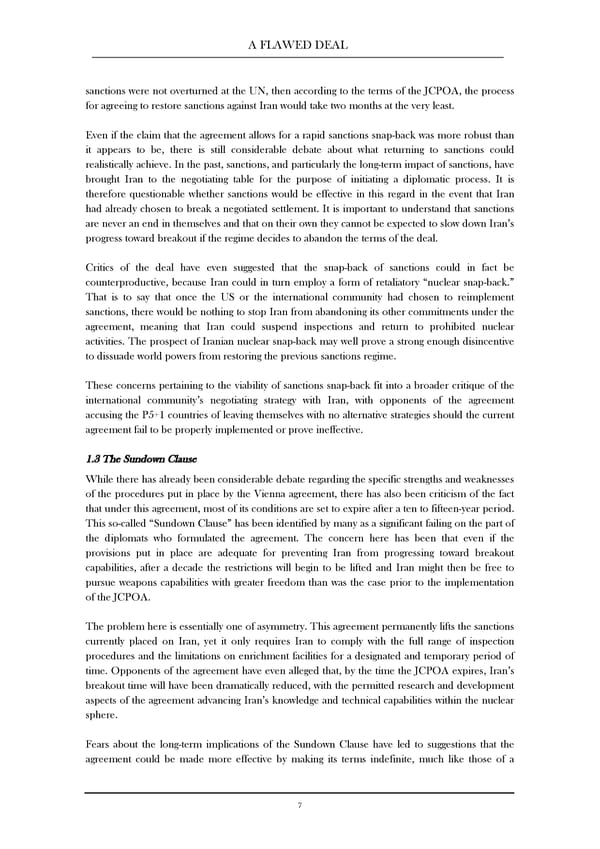! A FLAWED DEAL sanctions were not overturned at the UN, then according to the terms of the JCPOA, the process for agreeing to restore sanctions against Iran would take two months at the very least. Even if the claim that the agreement allows for a rapid sanctions snap-back was more robust than it appears to be, there is still considerable debate about what returning to sanctions could realistically achieve. In the past, sanctions, and particularly the long-term impact of sanctions, have brought Iran to the negotiating table for the purpose of initiating a diplomatic process. It is therefore questionable whether sanctions would be effective in this regard in the event that Iran had already chosen to break a negotiated settlement. It is important to understand that sanctions are never an end in themselves and that on their own they cannot be expected to slow down Iran’s progress toward breakout if the regime decides to abandon the terms of the deal. Critics of the deal have even suggested that the snap-back of sanctions could in fact be counterproductive, because Iran could in turn employ a form of retaliatory “nuclear snap-back.” That is to say that once the US or the international community had chosen to reimplement sanctions, there would be nothing to stop Iran from abandoning its other commitments under the agreement, meaning that Iran could suspend inspections and return to prohibited nuclear activities. The prospect of Iranian nuclear snap-back may well prove a strong enough disincentive to dissuade world powers from restoring the previous sanctions regime. These concerns pertaining to the viability of sanctions snap-back fit into a broader critique of the international community’s negotiating strategy with Iran, with opponents of the agreement accusing the P5+1 countries of leaving themselves with no alternative strategies should the current agreement fail to be properly implemented or prove ineffective. 1.3 The Sundown Clause While there has already been considerable debate regarding the specific strengths and weaknesses of the procedures put in place by the Vienna agreement, there has also been criticism of the fact that under this agreement, most of its conditions are set to expire after a ten to fifteen-year period. This so-called “Sundown Clause” has been identified by many as a significant failing on the part of the diplomats who formulated the agreement. The concern here has been that even if the provisions put in place are adequate for preventing Iran from progressing toward breakout capabilities, after a decade the restrictions will begin to be lifted and Iran might then be free to pursue weapons capabilities with greater freedom than was the case prior to the implementation of the JCPOA. The problem here is essentially one of asymmetry. This agreement permanently lifts the sanctions currently placed on Iran, yet it only requires Iran to comply with the full range of inspection procedures and the limitations on enrichment facilities for a designated and temporary period of time. Opponents of the agreement have even alleged that, by the time the JCPOA expires, Iran’s breakout time will have been dramatically reduced, with the permitted research and development aspects of the agreement advancing Iran’s knowledge and technical capabilities within the nuclear sphere. Fears about the long-term implications of the Sundown Clause have led to suggestions that the agreement could be made more effective by making its terms indefinite, much like those of a 7 ! !
 A Flawed Deal Page 9 Page 11
A Flawed Deal Page 9 Page 11